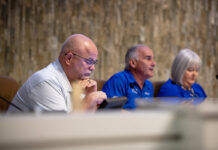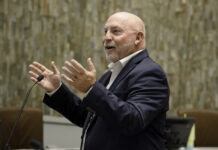
More than a year after a city council member resigned amid complaints of misconduct, Maricopa’s elected officials will consider adopting an ethics code tonight that outlines a formal procedure for reporting improper behavior and lists sanctions that can be taken against violators.
The ethics code is geared toward council members only. It was developed by a task force consisting of Mayor Christian Price and council members Julia Gusse and Peggy Chapados.
The council will decide whether to adopt the ethical guideline into city code. If adopted, all future council members would be required to read and sign the ethics code prior to taking office.
Former council member Alan Marchione resigned in October 2012 amid allegations that included sexual harassment and threatening employees. Phoenix attorney Bill Sims, hired to investigate the complaint, found that Marchione did not sexually harass or threaten employees, but said Marchione was “abrasive.”
Sims pointed out the city did not have disciplinary measures in place for a council member who misbehaved. The task force, created by Price, has met multiple occasions throughout the year starting in January.
“We’ve spent an exhausting amount of time on this,” Gusse said. Price and Chapados could not immediately be reached for comment.
Chapados was appointed to the council in November 2012 following Marchione’s vacancy.
In an editorial published prior to Marchione’s resignation and her appointment, Chapados said having a code of ethics would “ensure a safer, non-hostile work environment and will provide options for a course of action to address future issues.”
“(A council members’) position brings great authority, and an even greater responsibility,” she wrote. “Any misuse of either betrays the essence of the oaths they took.”
Chapados plans to write another editorial following tonight’s vote.
Gusse said the task force incorporated bits and pieces from ethics codes in Valley cities and cities outside the state.
The proposed code addresses multiple issues that include transparency, conflicts of interest, appearance of impropriety and courtesy.
Under a section titled “Professionalism and Courtesy,” the code lists the manner in which council members should behave in public and during meetings. These include: “Be attentive, respectful and polite,” “Avoid personal disparaging comments or references,” “Focus on the action, not the individual,” and “Respect differences.”
Gusse said for this section, task force members wanted to be specific and precise.
“What’s courteous to you might not be what’s courteous to me,” she said.
The code also requires council members to keep their personal and professional relationships separate, to avoid sexual harassment (even comments that could be perceived as sexual in nature) and avoid inappropriate humor.
The code outlines a formal process for filing complaints against a council member who violates the code. It states a person should file the complaint with the city manager and city attorney and inform the alleged violator of their intention to file.
Once an investigation into the complaint is completed, it will be presented to council. The council will need to vote in an open meeting on whether a violation has occurred, and also vote for any recommended sanction. A two-thirds vote is required in both cases for approval.




![In mayoral race, it’s the Nancy Smith show Maricopa Chamber of Commerce Executive Director Kelly Anderson grills incumbent Mayor Nancy Smith in election's first campaign event April 30, 2024, at Southern Dunes Golf Club. [Elias Weiss]](https://www.inmaricopa.com/wp-content/uploads/2024/04/CRM_1009-218x150.jpg)
![City gave new manager big low-interest home loan City Manager Ben Bitter speaks during a Chamber of Commerce event at Global Water Resources on April 11, 2024. Bitter discussed the current state of economic development in Maricopa, as well as hinting at lowering property tax rates again. [Monica D. Spencer]](https://www.inmaricopa.com/wp-content/uploads/2024/04/spencer-041124-ben-bitter-chamber-property-taxes-web-218x150.jpg)
![3 things to know about the new city budget Vice Mayor Amber Liermann and Councilmember Eric Goettl review parts of the city's 2024 operational budget with Mayor Nancy Smith on April 24, 2024. [Monica D. Spencer]](https://www.inmaricopa.com/wp-content/uploads/2024/04/spencer-042424-preliminary-budget-meeting-web-218x150.jpg)




![Maricopa restaurateur makes Food Network connection [Namkeen Dhaba]](https://www.inmaricopa.com/wp-content/uploads/2024/04/439456716_377105198650519_7536248579664805896_n-218x150.jpg)
![Merging lanes incite more 347 anger A merging lane sign sits on the side of State Route 347 northbound lanes during evening traffic on April 30, 2024. [Monica D. Spencer]](https://www.inmaricopa.com/wp-content/uploads/2024/04/spencer-043024-adot-merging-lanes-347-web-218x150.jpg)




